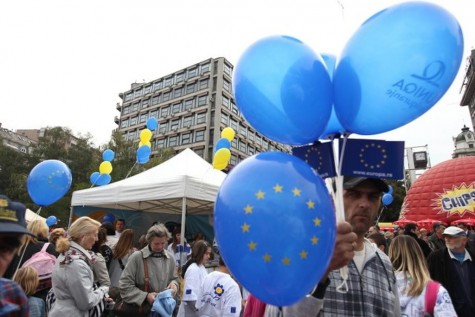Education, employment and environment protection within the EU were issues the students of Belgrade High school for textile design were eager to discuss with guests from the EU Delegation to Serbia and EU Info Centre at the promotion of Europa Diary.
Presenting the fifth Serbian issue of Europa Diary, which is out of print and being distributed to second grade pupils and teachers in 440 high schools across Serbia, the EU Delegation’s Head of Information, Communication and Press Ramūnas Janušauskas said the Diary is an entertaining tool adjusted for highschoolers that offers basic information about the EU.
“The Diary contains a special chapter on Eurointegration process in Serbia but also chapters about other issues such is environment, consumers rights, sport or human rights,” Janušauskas said.
“There is of course a lot of other things which we are trying to do to inform you about the EU because we think it is important for you as we hope that you will be joining EU in a matter of few years when Serbia is ready to do that,” he added.
School’s graduate Nevena Rimac was first to talk about what she and her fellow students were interested in when talking about European Union: “We would like to hear about the possibilities of studying in the EU, on both ours and the rights of others, on tolerance and stopping the violence.”
Irena Žuvela of Serbian Tempus Office and Erasmus Mundus scholar Sofija Petrović provided the students with firsthand information about the possibilities of further study in the EU, but they also informed the teachers about the forthcoming professional training novelties in one of the EU Member States.
This hanging out event called “Let’s talk about Europe” was also an opportunity for students to have their say on Europe and Serbian EU accession.
“First thing that comes to my mind when I think about Europe is a possibility to travel visa-free across the EU, and to learn from the travelling experience,” said Aleksandra, one of the pupils.
Most of the students agreed that the EU was much better organised than Serbia, saying they were aware of numerous possibilities to influence the changes in their own environment in order to get the country closer to EU standards and get a better quality of life.
“We should sweep in front of our own door, rather than wait for somebody else to help us,” one of the participants concluded.
Team Leader at EU Info Centre (EUIC) Davor Glavaš invited the students to come to Belgrade Youth Centre and take part in activities organised by the EU Delegation and EUIC, aimed at helping Serbian citizens, and above all young people, to better understand the EU integration processes.
“Visit us and we’ll bring you closer to the EU accession process and show why it matters to you. No question will remain unanswered and I am sure we can convince you that you are capable to play a role in changing your country on its way to the EU,” said Glavaš.
Janušauskas invited the students to attend the European Film Festival which takes place from 16 May in Belgrade Youth Centre.
Several highschool students expressed interest in participating in the activities within the Green month organised by the EU Delegation each June, thus today’s talk did not mark the end of learning about the EU for future designers.





